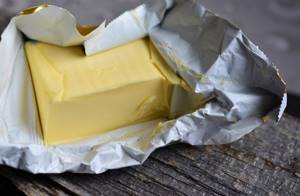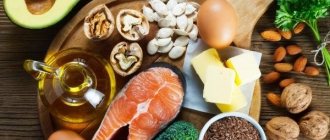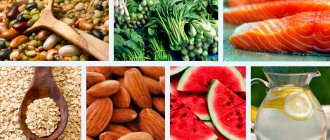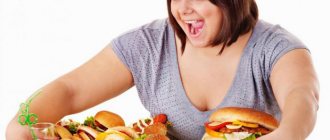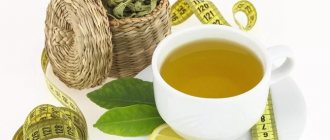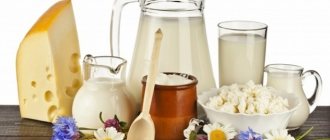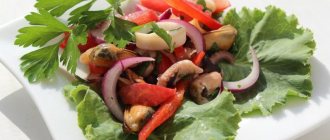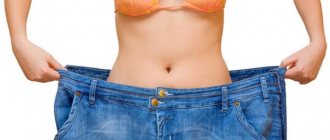There is a stereotype that fatty foods should be excluded from the diet of a person losing weight, although this is not true.
There is a certain type of fat (macronutrients), the presence of which in foods helps normalize metabolic processes and energy production. When choosing foods, it is recommended to pay attention to healthy fats; unhealthy types should be abandoned.
What are the benefits of fats?
A person gets fats from food. Together with proteins and carbohydrates, they perform many functions important for the physiological processes of the human body.
For example:
- participate in the formation of cell membranes;
- ensure the normal functioning of the digestive system;
- help synthesize sex hormones, enzymes, immune system cells;
- are the main source of energy for humans, enriching brain cells (fats provide 80% of the body’s energy reserve);
- maintain a constant internal body temperature.
Along with the benefits, some types of fats bring obvious harm. Animal fats are poorly absorbed by the body, settling in the form of accumulations of visceral fat on internal organs. The cholesterol released in this process causes significant harm to the human body.
Attention! It is a misconception that low-fat foods are good for weight loss. In them, fat is replaced with synthetic components or sugar. For example, in low-fat yogurt it is fructose syrup, which causes obesity, so you will not be able to burn fat for weight loss with this product.
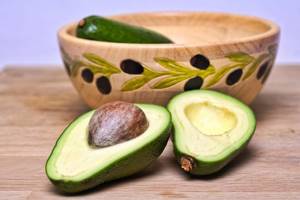
Expert opinion .
Dr. Alexander Myasnikov believes that “the fight against cholesterol has led to a decrease in daily fat consumption, as a result, the number of patients with diabetes and obesity has increased.” Therefore, he advises following the recommendations of nutritionists around the world: be sure to include healthy fats and exclude harmful fats from your diet.
Types of fats
Experts distinguish between four types of fats; information can be found on labels or on the Internet. It is recommended to first identify the composition and beneficial properties of the product; preference should be given to high-quality, safe food.
Main types of fats:
- Saturated ones can be harmful and beneficial. According to recent studies, it is recommended to include them in the diet; there is no correlation between their presence in the menu and heart disease. It should be borne in mind that not all saturated fats are healthy; preference should be given to meat, eggs, nuts; fried bacon, boiled sausage, and palm oil are considered harmful.
- Trans fats - the product is a vegetable oil with the addition of hydrogen and other ingredients. They are designed to extend the shelf life of foods and also add flavor. Most food items contain harmful trans fats; this category includes frozen pizza and French fries.
- Monounsaturated fats are considered beneficial for the body; they are part of olive oil and do not harden at room temperature. Coconut oil hardens quickly at room temperature due to the presence of this type of fat in the composition.
- Polyunsaturated - included in healthy and unhealthy foods; salmon is considered healthy; corn oil is recommended to be excluded from the diet.

What fats are needed for weight loss
The right fats keep the body healthy. Without them, the process of hormonal metabolism and rapid satisfaction of hunger is impossible. The right fats promote weight loss and fat burning, renew the skin and improve the condition of the gastrointestinal tract.
They are divided into 4 main types:
- Saturated – synthesize sex hormones, increase the content of healthy cholesterol. Source: animal products.
- Monounsaturated – promote the breakdown of lipids (fats), remove unnecessary cholesterol, these are the fats you need when losing weight. Source: high-calorie foods of plant origin.
- Polyunsaturated compounds are the basis for cell formation and do not accumulate in the body. The main source is fish and plant products. To lose weight, daily intake of fats from this group is also required.
- Trans fats are the most dangerous, leading to obesity and diabetes. Contained in industrial sauces, seasonings, sweets, fast food.
The list of fats for weight loss includes mono and polyunsaturated fats. At the same time, the healthfulness of fats is influenced by the method of preparing foods.
Important! Fast food products have a high glycemic index, which leads to disruption of natural chemical reactions of cells, metabolic processes, and weight gain.
The structure of fats can be determined visually. Unsaturated fats are liquid, saturated fats are solid. Diets containing healthy fats help combat 21st century diseases Alzheimer's and Parkinson's.
Omega-3 and Omega-6 polyunsaturated fatty acids: benefits
Fatty acids and fats are useful for those losing weight - they accelerate metabolic processes in the cell. Polyunsaturated fatty acids, or PUFAs, are especially valuable . They have high biological activity - they increase the rate of basal metabolism. Polyunsaturated acids contribute to the rapid conversion of calories from food into energy. Thanks to them, a person is active and cheerful, and everything eaten is in no hurry to turn into fat.
For weight loss and good health, 3 polyunsaturated fatty acids are needed: linoleic and arachidonic (Omega-6) and linolenic (Omega-3). They are not produced in the body and can only come from the outside - with food or as part of dietary supplements. These three PUFAs are also called vitamin F. Linoleic acid regulates the metabolism of lipids, sugars and proteins and accelerates the removal of waste substances from the cell. Arachidonic acid is synthesized from linoleic acid. It increases blood flow to the muscles and promotes the growth of “lean” muscles. Linolenic acid is an essential polyunsaturated fatty acid found in seeds, nuts and vegetable oils. It accelerates the process of losing weight by normalizing lipid metabolism and helps to “neutralize” “bad” cholesterol.
To be healthy and slim, it is important to consume polyunsaturated fatty acids in the correct proportion: Omega-6 acids are required by the body 5-6 times more than Omega-3. Imbalance or excessive consumption of fatty foods can contribute to weight gain.
The ideal ratio of Omega-3 and Omega-6 is found in olive oil.
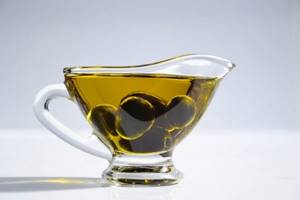
Daily fat intake for weight loss
According to WHO recommendations, the norm is to consume 30–70 g of fat per day or 30% of the daily calorie intake. The estimated value is 0.7–0.8 g of fat for every kg of human weight. More than half should come from healthy fats for weight loss.
Expert opinion. Polish nutritionist Jan Kwasniewski, the author of “optimal nutrition with a predominance of fats in the diet,” believes that “per day you need to consume 2.5–3 parts of fat, 1 of protein, 0.8 of carbohydrates. Breast milk has this proportion. You need to eat 2-3 times a day. Avoid fiber, fruits and vegetables completely.”

This point of view is directly opposite to the opinion of most nutritionists, who believe that fats and carbohydrates are of little use for weight loss. However, J. Kwasniewski is firmly convinced that the proof of the benefits of his system is a consistently good mood and the absence of a constant desire to eat something.
The ratio of proteins, fats and carbohydrates (BJU) is of great importance in organizing a diet for weight loss.
Attention! Weight gain does not come from fat, but from excess calories. The daily intake of proteins, fats and carbohydrates for weight loss should cover the daily calorie deficit.
With the correct ratio of BJU and provided that the menu includes products with animal proteins, slow carbohydrates and polyunsaturated omega acids, effective weight loss is guaranteed.
Scientific views on the percentage of BJU differ. In Soviet times, the ratio 1:1:4 was considered the norm, modern experts suggest 4:2:4, for those who want to lose weight - 5:1:2 with mandatory sports.
Healthy fatty foods
When compiling products, it is recommended to pay attention to products that can be bought in any store.
Cheese
The product is high in fat, so its content in the diet should be limited. Even a small piece can create a quick feeling of fullness; the product satisfies the feeling of hunger for several hours. It is recommended by nutritionists to patients who constantly feel hungry.
Yogurt
Yogurt is considered an excellent snack; it contains proteins and calcium. Some manufacturers add sugars to yogurt, which can be harmful to the body.
When purchasing a product, you should pay attention to the fat content level; it should be normal. Preference should be given to products with reduced sugar content.

Olive oil
Olive oil - the product contains saturated fats, as well as antioxidants and components with anti-inflammatory and analgesic properties. Oleacansal, which is part of olive oil, shows effectiveness in combating certain signs of diseases and the causes of their occurrence, like some medications.
Seeds
Seeds are high in calories and must be included in the diet, but their consumption must be strictly controlled. Preference should be given to chia, flax, and sunflower seeds. They are considered a source of omega-3 fats, fiber, and antioxidants.
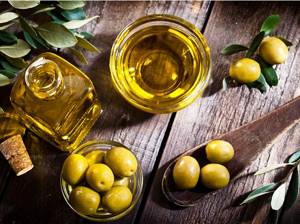
Nuts
Nuts - due to their high fat content, are recommended for consumption in limited quantities; they are beneficial for the central nervous system and skin. They have a high energy value; a handful of nuts is enough to get a positive effect. It is best to eat small portions of nuts before exercise.
Avocado
Avocado - the fruit contains monounsaturated fats and other beneficial substances. When losing weight, it is recommended to consume half a fruit.

Olives
Olives - contain monosaturated fats, their consumption helps reduce blood cholesterol levels, they provide support for optimal sugar concentration.
Eggs
Eggs - when losing weight, it is recommended to include whites and yolks in the diet, which contain essential fats.
They should not be abused; it is not recommended to exceed the daily dose.
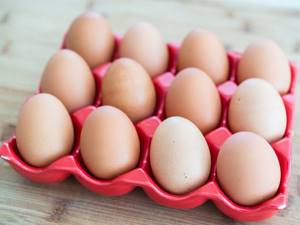
Fish
Fatty fish (salmon, trout) contain omega-3 fats that are healthy for the body.
Chocolate black
Dark chocolate contains healthy fats and other nutrients. The product has a positive effect on mood and is ideal when the body craves something sweet. Preference should be given to chocolate varieties containing 70% cocoa.
As a result of numerous studies, it has been found that regular consumption of chocolate helps normalize blood pressure, lower blood cholesterol levels, and reduces the possibility of blood clots.
Fats and diet. Daily norm for weight loss.
Details

Hello, dear readers of dietalegko.com, in this article we will talk about fats, their types, how to distinguish between good and bad fats, and how they affect the weight loss process in general.
We will understand the issues related to the consumption of fat when losing weight, and we will learn to calculate the individual rate of consumption of these substances per day during the diet.
I want to start with another personal story of my weight loss, where I’ll tell you about the mistakes that I made and that prevented me from achieving my goals.
Having made the decision to lose weight, I reviewed my diet and the first thing I did was remove all kinds of fatty foods. I believed that it was necessary to exclude them as much as possible. I ate exclusively vegetables, low-fat dairy products and allowed myself some fruit. At that time, I considered meat and fish products unsuitable for weight loss, since they contain fats. Perhaps you recognize yourself here too.
After only a week of my diet, I began to feel tired and irritated, and after two weeks my hunger was ravenous. I didn't understand why this was so? Why didn't everything I ate make me feel full? But it turns out it’s all about the fats that I threw out of my menu.
If you are faced with a similar problem, reconsider your diet and especially pay attention to the fat content in your menu, what foods you use them with and in what quantities.
I recommend paying attention to these articles, they complement this topic well:
- Basic protein foods and their benefits for weight loss.
- Simple and complex carbohydrates. Product table.
- Main sources of protein for humans.
- Carbohydrates you shouldn't eat on a diet.
In order to help you understand the topic of fats during weight loss, I will provide you with information based on my personal research and observations, obtained by studying books on weight loss and the Internet.
It turns out that fats are simply necessary when losing weight, and their amount is individual for each person. I wish someone had told me this earlier.
The benefits of fats for the human body when losing weight:
- - they are a source of energy;
- - participate in the formation of brain neurons;
- - ensure the functioning of the immune system;
- - stimulate the release of bile during digestion;
- - promote the absorption of vitamins and microelements;
- — calcium absorption in bones also occurs in combination with fats;
- - regulate metabolic rate;
- — saturate the body and thereby ensure the absence of hunger, which in turn does not provoke a person to overeat.
How to calculate your daily fat intake when losing weight.
Nutritionists say that when losing weight, you need to reduce your fat intake to 80 g per day. And the best solution to this issue is to calculate the individual norm of fat consumed. There are several ways to help make calculations.
1st method.
For heights up to 165 cm, subtract 100; If your height is 166 - 175 cm, subtract 105; Height over 175 cm, subtract 110.
The resulting calculation results will correspond to your norm of fat consumed per day when losing weight in grams.
2nd method.
I find this method more effective because you can eat different amounts of fat each day. This amount is calculated using each person's individual minimum daily intake and does not exceed 80 g of fat per day.
The minimum individual amount of fat can be calculated by multiplying your ideal weight by 0.8.
You can find out your ideal weight using Brocca's formula by following the link.
For example, your ideal weight is 65 kg. 65* 0.8=52 g
Your minimum intake of fat when losing weight is 52 g. If you create your daily diet with the amount of fat in the range of 52-80 g, this will be enough for comfortable weight loss, good health and the absence of hunger.
But the benefits of fat are possible only if it is consumed correctly.
Good and bad fats.
What fats to consume when losing weight, and which ones are better to limit or completely exclude from your diet.
Conventionally, these substances can be divided into two types:
- vegetable
- and animal origin.
And in terms of its composition:
- to those saturated with fatty acids
- and unsaturated.
Saturated fats remain solid at room temperature. To melt their contents, they should be heated well. It is for this reason that when they enter the human body in large quantities, they cause diseases of the cardiovascular system, causing an increase in cholesterol in the blood. In addition, consuming saturated fat leads to obesity.
Saturated fats are found in meat, fish, eggs, and dairy products (lard, margarine, butter, cream, lard, etc.). Very often they are used in fast foods, various baked goods, and confectionery products.
Therefore, people who want to stay healthy and slim try to exclude such foods from their diet. Meat, fish, eggs and dairy products are important for the healthy development of the human body, so they need to be consumed in a certain amount and choose less fatty varieties.
Unsaturated fats are found in vegetable oils (sunflower, olive and coconut oils, as well as nuts and seeds). These fats are considered one of the most beneficial for the human body during various diets, since their insufficient intake harms the functioning of the gastrointestinal tract and nervous system, leads to weakened immunity, memory impairment and the development of atherosclerosis.
Read: - Fat-burning foods that help you lose weight.
To summarize, I want to emphasize that fats must be present in your daily diet during weight loss. The main thing is to be able to understand foods that contain healthy (unsaturated) and harmful (saturated) fats, then your weight loss will be effective and will not harm your body.
When losing weight, fats should be consumed in the form of vegetable oils. Use olive, sunflower, and flaxseed oil for dressing salads and preparing dishes. You also need to consider getting fats through dairy products, meat, eggs and fish.
Use low-fat varieties of these products in your diet, since the breakdown of 1 gram of fat releases as many as 9 kilocalories. If these kilocalories are not consumed, they are deposited in the body in the form of fat reserves in the liver, subcutaneous fat, internal organs and other fat depots.
The diet of a person losing weight should not contain products such as margarine, butter, various spreads and lard. You also need to exclude baked goods, confectionery, fast food, fatty sausages and fatty meats and fish.
When creating your diet menu, do not forget about the quality and quantity of fat consumed in your daily diet. Remember that a low-fat diet leads to chronic hunger and can cause serious metabolic disorders.
We wish you to be healthy and slim!
Related materials:
- Which foods contain which vitamins and minerals.
- Glycemic index. Theory and tables, influence on weight loss.
- Blood sugar. Influence on the process of losing weight.
- What foods should you not eat when losing weight?
We recommend reading

Tags: fats, daily intake
Add a comment
Comments
1 Alla Lyapunova 03/30/2018 16:17 You can’t completely exclude fats from your diet... you should have both saturated and unsaturated fats every day. + in addition, it’s not bad to drink 3 capsules of omega 3 daily (I replace it with one capsule of triple Evalar omega), this is a very important supplement for the body.
Reply | Reply with quote | Quote
Update list of comments RSS feed of comments for this entry
Fat as an aid to satiation
Another interesting fact should be noted: fat causes the synthesis of the hormone cholecystokinin. This substance, in addition to all its functions, acts as a satiety regulator. That is, cholecystokinin sends a signal to the brain receptors that the body has received a sufficient amount of energy. But, in fact, the synthesis of not all hormones contributes to weight loss; read the article on the website why hormones cause weight gain.
What are fats for?
Our body needs fats in moderation (of course, the amount of healthy fats in the diet should be predominant). They are the most important source of energy, and also perform a number of functions that we cannot do without.
Lipids have protective (protection of internal organs from shocks and shocks), thermoregulatory, storage (reserve in case of lack of nutrients) and energy (vitality) functions.
| 1 gram of fat = 9.3 kcal |
In addition, we need fats for good brain activity, attention and memory. Fats make the body more resistant to infectious diseases and are the only source of essential fatty acids.
So, as you can see, giving up fat is wrong. But their reasonable consumption and choice in favor of good fats is what any practicing nutritionist will advise you.
Omega-3 and Omega-6 content in vegetable oils
To maintain the balance of omega acids in the body, it is necessary to use not only olive, but also various other vegetable oils. The most preferred: sunflower, rapeseed, mustard, flaxseed, corn.
% vitamin F content in vegetable oil
| Vegetable oil | Omega-3, % fatty acid content | Omega-6, % fatty acid content |
| Sunflower | 0,3 | 52–73 |
| Olive | 1,5 | 3–20 |
| Linen | 28–65 | 8–30 |
| Mustard | 5–16 | 9–23 |
| Rapeseed | 5–13 | 17–26 |
| Corn | 2 | 32–59 |
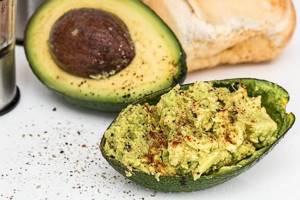
Where else are Omega-3 and Omega-6 found?
Don't be afraid of saturated animal fats . They contain a lot of vitamins A, D, E, K and other beneficial substances.
- Linoleic and arachidonic acids (Omega-6) are also found in beef, pork, chicken, duck, turkey, eggs, lamb kidneys, cattle liver, flaxseed, coconut oil, nuts, and avocados.
- Linolenic (Omega-3) - in seafood, cod liver, dry beans, lentils, fish oil, various nuts, beans, avocados.
Saturated animal fats are harder for your body to process, but that doesn't mean you have to give them up.
When creating a balanced diet, make sure that one third of the total fat comes from saturated fats, and two thirds from unsaturated fats.
